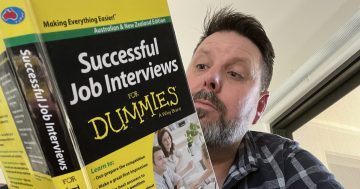Cheryl Lock* says it’s a good idea to ask questions at a job interview and offers some tips for when we can’t think of anything.
 At some point in a job interview — usually toward the end — the hiring manager may ask, “Now do you have any questions for me?”
At some point in a job interview — usually toward the end — the hiring manager may ask, “Now do you have any questions for me?”
You’ve likely heard that it’s important to head into every job interview prepared with some question as this shows you’re truly interested in the job, but what if you really have nothing to ask?
What if, perhaps, all of your questions were already answered?
In this case, should you try to come up with something? Or, is it fine to say you don’t have any questions?
We asked one hiring manager for his thoughts and he said you should always try to ask at least one question.
It shows engagement and involvement and forethought — all positives when you’re hoping to get hired.
But if you’re truly stuck, keep some of these suggestions in mind before heading into the interview. They may just help you come up with something on the fly.
Ask about advancement.
If it hasn’t already been covered, hiring managers always love to hear that a potential employee is interested in what job opportunities are available beyond the position they are actually applying for.
This shows that they’re thinking about staying at the organisation into the future and are willing to make a real commitment.
Be sure, however, to make it clear that you’re definitely interested in the job at hand, and not just trying to get into the company to move to another role.
Consider specific scenarios.
Depending on the type of job you’re applying for, there may be a bevy of questions available if you ask about specific scenarios.
For example, if you’re applying for remote work, be sure to always ask what resources are available to employees who work out of the office, how the chain of command works with people who aren’t in person every day, and what some of the major obstacles have been so that you can best avoid them.
Think outside the box.
If you can manage to come up with at least one or two unique questions during your interview (maybe you ask about ways the organisation fosters community amongst employees, or what remote workers have done in the past to foster relationships with employees they don’t see every day), you’ll really impress.
Turn the question back on the hiring manager.
Hiring managers usually like to answer questions about their own experiences, as long as they are framed in a positive manner.
For example, asking the hiring manager about the worst part of working somewhere is much different than asking them what they see as challenges that you could potentially help solve.
Take notes during the interview.
Taking notes during the interview shows that you’re fully present during it, and you may even end up jotting down a particular thought that you can circle back to and ask a question on later.
If you come to the end of an interview and you really, truly don’t have one thing left to say, it’s okay to say so.
Just be sure to ask if it’d be alright if you follow up with a phone call or email, should you think of something later.
* Cheryl Lock is a writer and editor.
This article first appeared on www.flexjobs.com.











